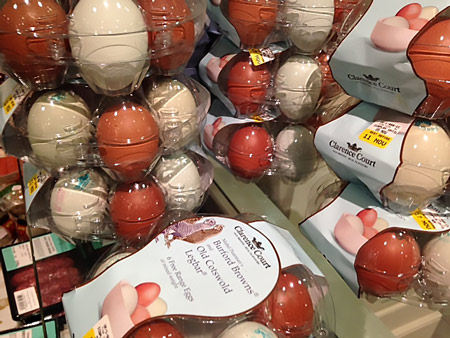Robert Owen Brown’s Lancashire baked eggs
Robert Owen Brown’s Lancashire baked eggs will not win the heart healthy nutrition prize but once in a while the cosmic sphincter opens overhead and you need some serious comfort in the aftermath of the evacuation. This is it; nothing but eggs, bacon, black pudding, cheese and scallion baked in an extremely hot oven on a cast iron skillet. The concept seems so obvious that it made the Editor feel foolish that she never cooked it up herself. Mr. Brown it transpires is full of such welcome surprises.

- 2 Tablespoons neutral oil
- 2 chopped bacon slices
- about half a diced black pudding
- 2 minced scallions
- 4 beaten eggs
- generous ½ cup grated Lancashire or other hard British cheese
Preheat the oven to 450°.
- Heat the oil in the appropriate skillet over medium heat until shimmering, then add the bacon and pudding until they crisp: It will not take long.
- Stir the scallion into the meat, pour on the egg and top it with cheese.
- Bake the Lancashire eggs until bubbly and specked with brown. Six minutes will give a firm texture; four or five something moist.
Notes:
-Brown calls the dish an omelet. That is pushing things too far.
-By any name this is a hearty dish for a hungry soul, or for two dainty diners.
-The recipe appears in his Crispy Squirrel and Vimto Trifle , published in Manchester during 2013 and a sign of the great Northern city’s revival. The book itself ought to be a template for every small manual of cookery. Its recipes have been chosen well, the prose sings and Brown has a few good tales to tell.
-He uses duck eggs here, three of them, and they are an improvement if you are lucky enough to score some.
-His bacon of course would be the unsmoked English or Irish variety of cured loin but smoky bacon cut from the belly is good as well.
-Lancashire, among the best of all cheeses, unfortunately is hard to find in the United States. A sharp Cheddar, whether out of Vermont or from Cheddar itself, where it is called ‘mature,’ will do decent substitute service.

